Cassette split system: design features, pros and cons of technology + installation nuances
From a technological point of view, the cassette split system is not much different from the classic design of an air conditioner. An obvious difference from the classics is only that the cassette split system uses an internal module not of a wall, but a subceiling type.
Everything else is the actual analogy of the classics, including the principle of work, the pros and cons of the design, the features of the installation work. In this article, we consider in detail all the features of a cassette configuration system, including the device, the principle of operation, its advantages and disadvantages, as well as the subtleties of equipment installation.
The content of the article:
Household cassette air conditioner
Cassette-type cooling technology is a two-module system, thanks to which the function of cooling the air to a given temperature is carried out.
The cassette split system consists of the following modules:
- External (street).
- Interior (apartment, office).
Both modules of the kit are individual units, which, when the system is installed in working condition, are combined by technological pipelines and electrical connections.
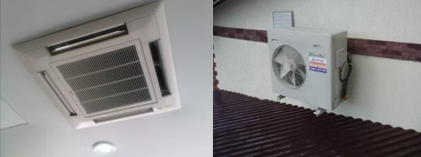
It should be noted: cassette-type split systems are more often used as office equipment, installed at small businesses and inside office buildings.
Application in apartments or houses is a rare phenomenon. The main reason for this situation is the need for a false ceiling device at the facility, because the indoor module has the purpose of mounting under the ceiling.
The structure of the external module
This part of the design of the cassette air conditioner fully corresponds to the classic version of household air conditioning systems.
The block street module contains the following components inside:
- compressor;
- capacitor;
- fan;
- elements of automation;
- electrical parts.
A compressor and a condenser are combined by a refrigeration circuit charged with freon, from which contact points are made through a pair of linear shut-off valves for connection to the indoor unit.
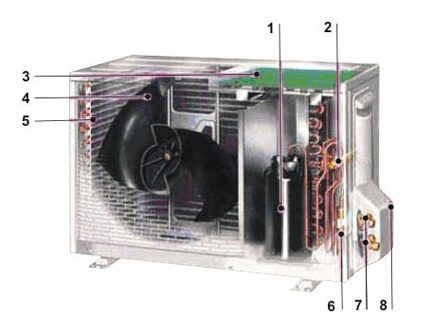
Electrical connections for automatic control and compressor power of the external module are also output to the contact panel of the internal module, where they are switched accordingly (according to the diagram) and are output to the general power supply.
Features of the indoor unit
This part of the air conditioner is made in the form of a working block cassette with a panel designed for installation in a ceiling structure. Moreover, the ceiling structure should have a so-called false ceiling.
The working (system) block “hides” under the false cover, and the distribution panel remains on the same plane with the false cover.
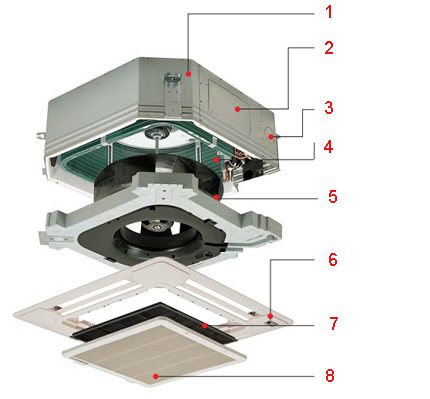
The distribution panel of the internal cassette unit as a whole contains several elements:
- Intake grille.
- Coarse filter.
- Filter ionizer.
- Rigid frame.
- Front overlay.
- Distribution shutters.
An air intake grille with ionization filters, coarse cleaning and a rigid frame is located in the central area of the distribution panel.
Along the perimeter - on the sides of the same distribution panel - are the chilled air outlet channels, supplemented by shutters with automatic cyclic flow control.
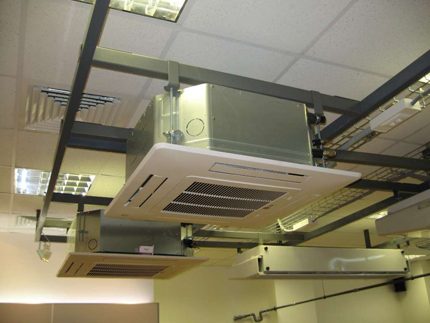
The front cover of the distribution panel of the cartridge, among other things, contains a light indication board and a remote control. There is a model equipped with a wired remote control.
The cassette working unit, “hidden” under the false ceiling, is part of the refrigeration design, including: an evaporator, a fan, a condensate drain, line connection units from the outdoor module, and an electrical connection board.
How does the cassette system work?
Actually, the principle of operation of the classic air conditioning system does not change here. Also, refrigerant is used from those brands that are most often used in practice. That is, for example, R410A refrigerant and similar refrigerants.
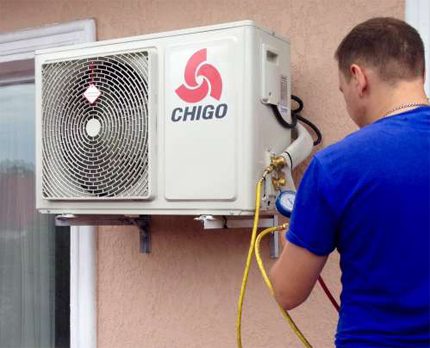
The system circuit is charged with such a substance, provided that the cassette unit is fully assembled, combining the external and internal modules. We recommend that you familiarize yourself with the intricacies of self Freon system refills.
After turning on the cassette split system in operation, the freon circulates inside the circuit due to the compressor. Its circulation leads to cooling of the evaporator.
Through the evaporator located in the cassette housing of the indoor unit, air is drawn in by the fan, which is sucked in through the air intake grille.Cooled by the evaporator, air is supplied to the outlet into the side channels equipped with shutters.
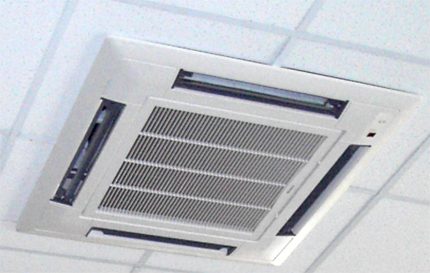
The design of the side channels has a characteristic design - the bend of the outgoing part by about 30-35 degrees. Therefore, the cooled air stream coming from the channels of the cartridge is directed not vertically downward, but to the sides.
Given the presence of channel outlets on all four sides of the distribution panel, the air flow is evenly distributed in four directions.
Advantages and disadvantages of equipment
Climatic technology cassette performance, as well as classic, has its pros and cons. Which we consider in more detail below.
The main advantages of cassette models
A clear advantage of cassette split systems is the uniformity of the air distribution of the flow over the area of the room.
Moreover, this predominant factor is directly related to installation requirements, according to which the installation of a ceiling cassette is provided exclusively in the central part of the room.
Due to the optimal placement of the cartridge and the same optimal distribution of air, it is possible to more effectively cool the rooms to the required temperature.
Another advantage is the architectural component. If classic split systems that use wall-mounted internal modules create real problems in terms of design organization, it is easier with cassette modules.
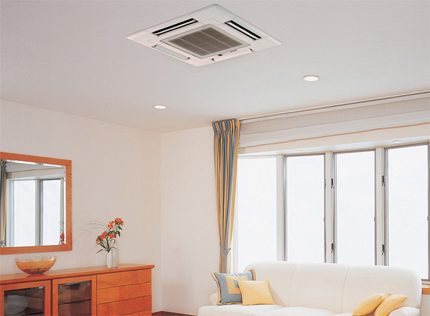
Moreover, often the cassettes built into the ceiling become design elements that enhance the overall appeal. This is especially noted in the design of office and administrative buildings.
The obvious flaws in technology
Cassette split systems are inherent and quite serious shortcomings. One of these pronounced shortcomings is seen in mounting restrictions. In particular, the possibility of installing equipment only in places with a false ceiling.
At the same time, not every design of a suspended ceiling can satisfy the installation requirements, since a certain gap is required between the real and false ceilings.
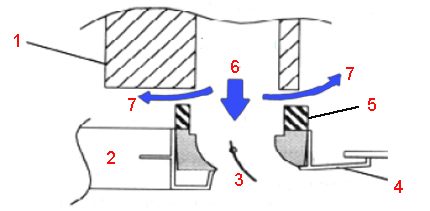
A disadvantage of such systems may also be poor insulation between the underside of the cassette and the distribution panel (figure above). In this case, the cooled air enters the subceiling space and condenses.
As a result, the effect of leaks and, as a consequence, the destruction of part of the design of the suspended ceiling is noted. However, this drawback is technically eliminated - by means of high-quality isolation.
Features of installing a cassette air conditioner
If we consider the external module of the cassette split system, there are no special features that distinguish the installation from the classic standard.
A completely different thing is the internal cassette module. In this case, its features associated with the installation are due to the design of the unit.
The main features of mounting the cassette module:
- the surface for the installation of the cartridge is strictly horizontal;
- the gap between the explicit and false ceiling is at least 350 mm;
- ceiling design must withstand 4 times the weight of the cassette;
- the mounting position corresponds to the required distances from obstacles.
When installing the system, one should take into account the location of doorways, heating elements, various heat sources.
Also, the installation position should be coordinated by the points of supply of power, by the possibilities of supplying the contour pipelines and the channel of condensate drainage.
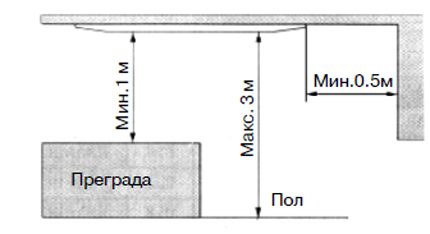
The cassette must be mounted in such a way as to exclude the presence of objects that impede the uniform distribution of air.
As a rule, it is necessary to install the cartridge module as close as possible to the central point of the room. Installation is carried out with the distribution panel removed and other components included in the panel assembly.
The cassette module is installed by suspension. Therefore, suspended metal rods have to be mounted on the main ceiling.
Holes for four anchor rods are drilled on the surface of the main ceiling. Pre-marked size (standard) between the rods in width and length.
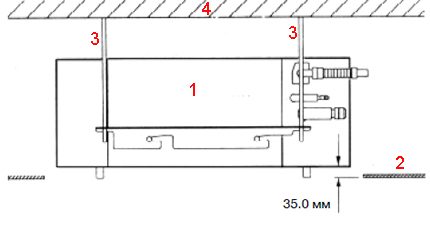
The cassette module is suspended on the installed rods, aligned with the level horizontally and fixed. Accordingly, it is required to divert the drainage line in accordance with all the rules - under a slope, without sharp bends. And also bring the tubes of the refrigeration circuit.
Only after these works are completed, the surrounding part of the false ceiling is assembled and the parts of the distribution panel of the split system cassette are installed.
In addition to the cassette, there are other types of ceiling air conditioning systems. To learn more about them, please go to the following the link.
Conclusions and useful video on the topic
A video clip about cassette systems is simple, understandable and without further ado about the structure of equipment, about operational capabilities. About everything that a potential owner needs to know:
Cassette-type split systems are quite interesting equipment due to their inherent design features and technical characteristics.
However, often cassette systems are not possible to install and operate at home, especially in apartments. Another issue is offices, administrative premises, business buildings. For such an architecture, equipment can be described as the most optimal.
Thinking about buying a cassette-type split system, but want to clarify some features that we did not touch on in this material? Ask your questions to our experts - we will try to help you.
If you notice a discrepancy in the material or want to supplement our publication with useful information, please write your comments in the block below.

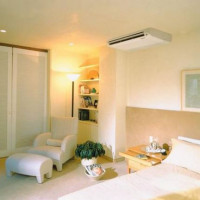 Ceiling split system: types of equipment and features of its installation + rating TOP-10 of the best models
Ceiling split system: types of equipment and features of its installation + rating TOP-10 of the best models 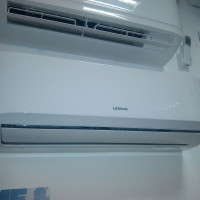 TOP-10 Split systems Lessar: features of models + nuances of the choice of climatic equipment
TOP-10 Split systems Lessar: features of models + nuances of the choice of climatic equipment 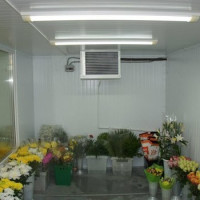 Split system for the refrigerator: types + nuances of calculation and selection of the necessary equipment
Split system for the refrigerator: types + nuances of calculation and selection of the necessary equipment 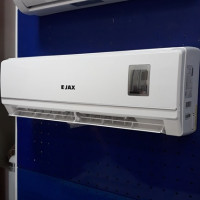 The best Jax split systems: seven popular models + the nuances of choosing climate technology
The best Jax split systems: seven popular models + the nuances of choosing climate technology 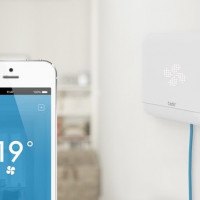 TOP-12 Wi-Fi split systems: overview of popular models among customers + selection features
TOP-12 Wi-Fi split systems: overview of popular models among customers + selection features 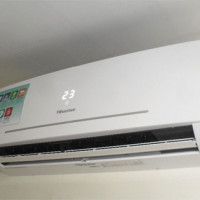 Hisense split systems rating: top 10 models + recommendations for choosing brand equipment
Hisense split systems rating: top 10 models + recommendations for choosing brand equipment 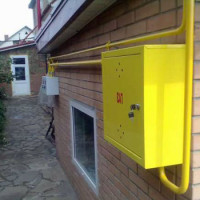 How much does it cost to connect gas to a private house: the price of organizing gas supply
How much does it cost to connect gas to a private house: the price of organizing gas supply  The best washing machines with dryer: model rating and customer tips
The best washing machines with dryer: model rating and customer tips 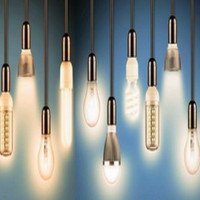 What is the color temperature of light and the nuances of choosing the temperature of the lamps to suit your needs
What is the color temperature of light and the nuances of choosing the temperature of the lamps to suit your needs 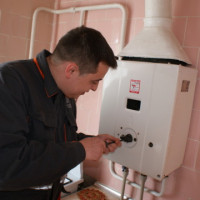 Replacement of a geyser in an apartment: replacement paperwork + basic norms and requirements
Replacement of a geyser in an apartment: replacement paperwork + basic norms and requirements
We need a conder for the room that will be used as a cafe. I want to get more or less uniform cooling of the entire room. Is it better to take a cassette or wall-mounted?